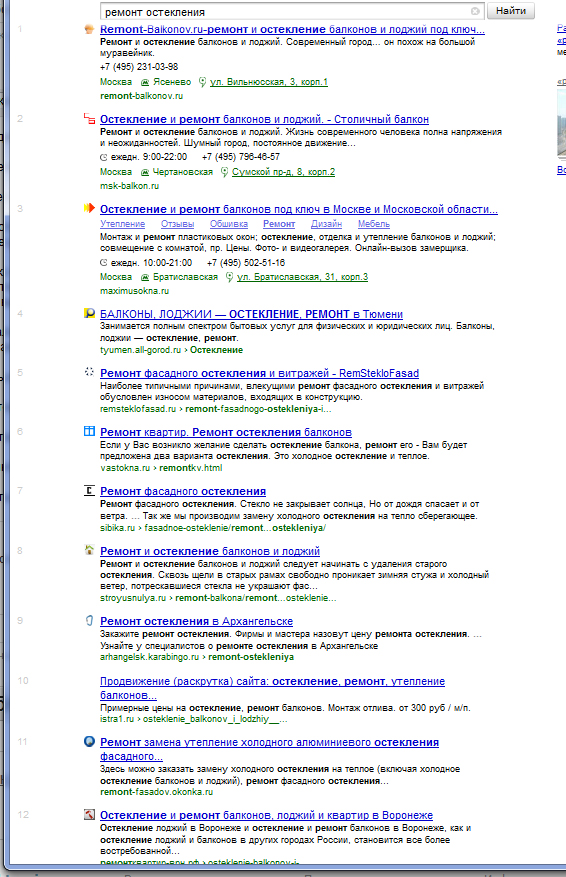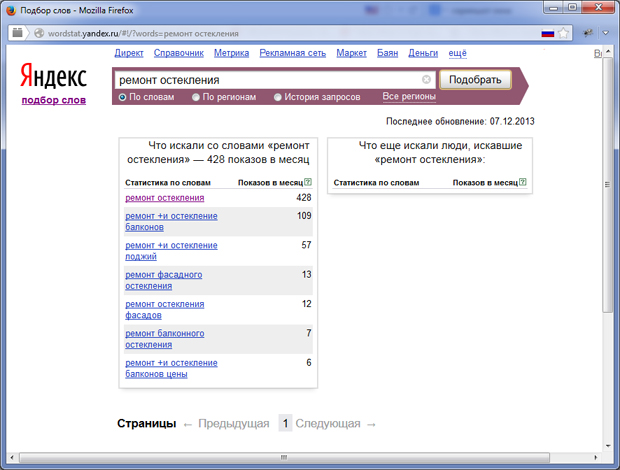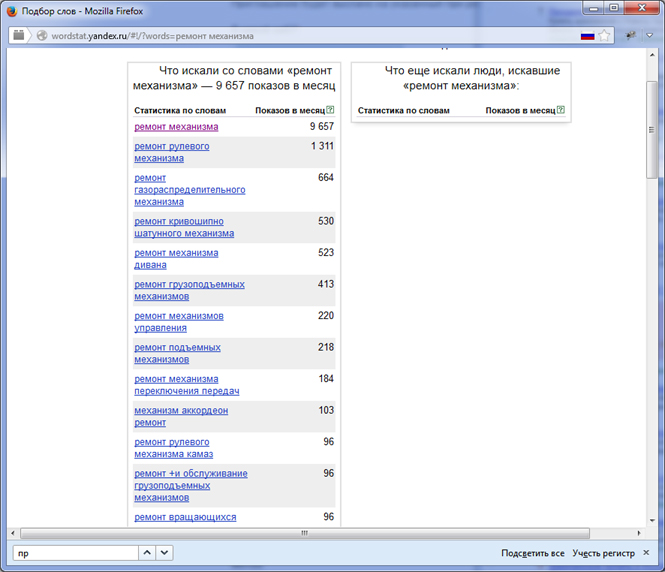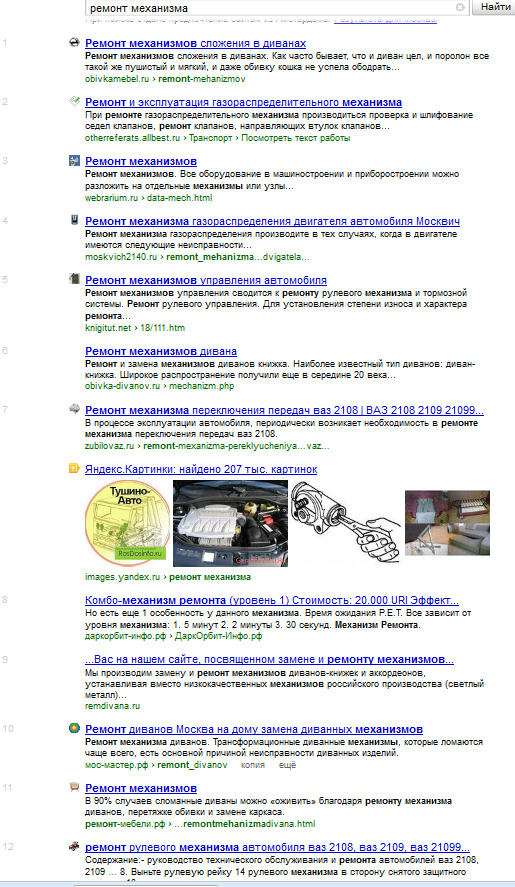How "non-reference" ranking factors of Yandex — analysis
Supplement from 23.01.14. This article was written on 30 December last year. The results have since changed, but by and large the information given is relevant. Since that time, there was still some data, however, on the one hand, too many in order to expand this article — and too little to new on the other. If the post will be of interest to the community, it is likely that after the accumulation of information will be the continuation associated with characteristic features not mentioned here factors.
Warning. The following should not be taken as accurate information is only a guess, is confirmed empirically.
Warning 2. Perhaps this information is news only in my "swamp", but the search did not give results anything like these findings.
All more or less relevant to the Internet, you know, which stood high, when Yandex announced that refuses the reference in the NG.
On the one hand, will be easier to live without search of garbage the world will be a little cleaner on the other — it is not clear how this is implemented and who it will hit (well, except copywriters-SEO and other brethren, of course, but also figs with them).
As I do, among other things, and is on the Network, I started with a voltage to keep an eye on the position of the sites of my clients, and along with the competitors. The results to become curiouser and curiouser. Obviously, non-reference factors gradually increased, and because the results on some queries, was quite unusual.
I tried to understand the logic of the algorithm and it is partially successful. Although, if my assumptions are correct, many that depend on sales through the network, quite frankly, will face hard times.
Yes and users will not be easier.
Those who are in a hurry: a brief summary at the end of the article.
The rest of the offer fully trace the train of thought and to correct the mistakes I may have made.
I was interested in the query "repair glass", which is associated with services of some firms with whom I collaborate.
Results it via anonymous time are:

I have to say, the data was surprising. Explain. Pay attention to the nature of sites in the results. For the first 12 seats have 9 pieces of loggias, balconies. In the "old mode" for this query tend to fight large companies involved in corporate orders the type of repairs glazing of the façade. It just so happened that this request was relevant for b2b, the main percentage of users, according to the practice, were from this area. For privateers, this request was not too typical. They usually formulate your request more clearly — after all, they had a concrete balcony, but not "glazing"
Statistics of queries in Yandex. direct is (here from anonymity had to be abandoned — need login):

As you can see, most appears just "Windows" as an object. However, when I looked at the results, I was called for...
Please note: the word "Windows" can be perceived in the Russian language in two ways. On the one hand, this word may denote an object. "Glazing" in the jargon of builders — glazing of the entire building together. On the other hand, the phrase "repair glass" can be seen as an unfinished phrase.
But the task of the searcher is to find what the user wants! Most of the specified request wanted exactly the balconies/loggia. Maybe that's why this topic got to the top? Is it possible that when you search there is a "hidden" query refinement is similar to the tip line popular requests?
That is to say, whether such a mechanism: Yandex completes the request "in mind" and based on expectations builds a results?
Should have checked. Then I needed the same "unfinished" request.
Let this be a "buy champagne". Direkt reported the following:

Please note — requests from end users set the tone — broken brands, however, wishing the same thing. But a significant part (though not most!) users interested in wholesale.
What we have in search? Here's what:

4 and 12 took the opt, despite the fact that the majority of users, judging by requests, it is of little interest, however, the number of lookups is large.
Bingo?..
However, there have been a counterargument: request "repair of machinery".
Direct:

The results:

The ratio of sofas to a car in the first dozen results: five-on-five.
If you calculate that the furniture subject to the directives that have not got into a screenshot of sofas will certainly be a little more, it will remain the second most popular theme, but on a one to one ratio, it still pulls!
Why?
Assumptions the following:
1) Begin to work those factors "usability", PF and other, about which so long spoke of the Bolsheviks, that is Yandex. Pronounced orientation to work through a network of "furniture" sites catches the eye. Similarly, in the query "toxic iron" Yandex is the leader encyclopedia on WoW, and not the reference books on biology!
2) the heterogeneity of the "road" and "technical" queries about furniture. They all want a sofa, and then KAMAZ, the wheel, the gear.
3) the Assumption, perhaps too arrogant, but there is a probability, and most page answering the "car" queries — not necessarily commercial. Moreover, it is often the information materials — sometimes, however, that they are placed on the websites of the commercial, but posing as information. At the same time, the results of the furniture is of pronounced commercial nature. Coincidence? It is possible that it works "usability" (what does it mean from the point of view of Yandex mystery), which is at commercial sites is higher than that of information. But maybe not. I couldn't give an accurate opinion on this question — is dialed too low statistics.
Further verification of the various requests more or less brought the theory to a common view. So...
1) Top results Yandex is based what I was looking for, along with these words (the query, that is) earlier. The position and number of subjects in the top issue correlated with this characteristic, although the exact dependence cannot be established — work and other factors.
2) One of these factors, perhaps (?), is a commercial/informational focus of the site — perhaps in favor of the former, however, information for the unambiguous conclusion is not enough.
3) the popularity of the subject lies the logic for request "poison gland" encyclopedia of Vovka above dictionaries and encyclopedias IRL's. In addition, the popularity of subjects is more important than the popularity of the term — "the poison gland of smartapplet" query unpopular, according to directives.
4) From the above there are both advantages and disadvantages from the point of view of the seeker and the website owner. More cons IMHO.
Pros:
From the point of view of the owner:
Part of the audience, passing by inaccurate query will come to him.
From the point of view of the user:
Incomplete or ambiguous query has a good chance to give some info
Cons:
From the point of view of the user:
When an ambiguous query, such as "repair glass", where the "glazing" can be considered as a separate word and the beginning of a phrase, he has a chance to get the info, interesting not to him but to the majority, the very conventional to the majority, is calculated incorrectly based on the lookup of those for whom this is the beginning of an expression (a present majority and to clarify in a head will not come, for them, is a complete sentence!).
For the site owner:
If it is, in the case described above is about the tweeters, due to which the company is the only living (as many in b2b market), it may very seriously damage the flow of customers from the Internet. Get a double competition — as with sites relevant subjects and irrelevant, moreover, in deliberately unequal conditions: to enter the three or seven — a big difference. In the "old regime", this risk is offset by a reference (worked correct usage for referring sites), but in its absence it turns out the real Babylonian confusion, with very small chances to reach their users.
Will kill whether it is Yandex? No. Going to make it better? Either.
I hope that in this attempt to study non-reference ranking factors of Yandex data were if not good, then a fascinating (naive, huh?).
Article based on information from habrahabr.ru
Introduction
Warning. The following should not be taken as accurate information is only a guess, is confirmed empirically.
Warning 2. Perhaps this information is news only in my "swamp", but the search did not give results anything like these findings.
All more or less relevant to the Internet, you know, which stood high, when Yandex announced that refuses the reference in the NG.
On the one hand, will be easier to live without search of garbage the world will be a little cleaner on the other — it is not clear how this is implemented and who it will hit (well, except copywriters-SEO and other brethren, of course, but also figs with them).
As I do, among other things, and is on the Network, I started with a voltage to keep an eye on the position of the sites of my clients, and along with the competitors. The results to become curiouser and curiouser. Obviously, non-reference factors gradually increased, and because the results on some queries, was quite unusual.
I tried to understand the logic of the algorithm and it is partially successful. Although, if my assumptions are correct, many that depend on sales through the network, quite frankly, will face hard times.
Yes and users will not be easier.
Those who are in a hurry: a brief summary at the end of the article.
The rest of the offer fully trace the train of thought and to correct the mistakes I may have made.
problem Statement
I was interested in the query "repair glass", which is associated with services of some firms with whom I collaborate.
Results it via anonymous time are:

I have to say, the data was surprising. Explain. Pay attention to the nature of sites in the results. For the first 12 seats have 9 pieces of loggias, balconies. In the "old mode" for this query tend to fight large companies involved in corporate orders the type of repairs glazing of the façade. It just so happened that this request was relevant for b2b, the main percentage of users, according to the practice, were from this area. For privateers, this request was not too typical. They usually formulate your request more clearly — after all, they had a concrete balcony, but not "glazing"
Statistics of queries in Yandex. direct is (here from anonymity had to be abandoned — need login):

As you can see, most appears just "Windows" as an object. However, when I looked at the results, I was called for...
Guess
Please note: the word "Windows" can be perceived in the Russian language in two ways. On the one hand, this word may denote an object. "Glazing" in the jargon of builders — glazing of the entire building together. On the other hand, the phrase "repair glass" can be seen as an unfinished phrase.
But the task of the searcher is to find what the user wants! Most of the specified request wanted exactly the balconies/loggia. Maybe that's why this topic got to the top? Is it possible that when you search there is a "hidden" query refinement is similar to the tip line popular requests?
That is to say, whether such a mechanism: Yandex completes the request "in mind" and based on expectations builds a results?
Should have checked. Then I needed the same "unfinished" request.
Validation
Let this be a "buy champagne". Direkt reported the following:

Please note — requests from end users set the tone — broken brands, however, wishing the same thing. But a significant part (though not most!) users interested in wholesale.
What we have in search? Here's what:

4 and 12 took the opt, despite the fact that the majority of users, judging by requests, it is of little interest, however, the number of lookups is large.
Bingo?..
Bummer
However, there have been a counterargument: request "repair of machinery".
Direct:

The results:

The ratio of sofas to a car in the first dozen results: five-on-five.
If you calculate that the furniture subject to the directives that have not got into a screenshot of sofas will certainly be a little more, it will remain the second most popular theme, but on a one to one ratio, it still pulls!
Why?
a Refinement of the hypothesis
Assumptions the following:
1) Begin to work those factors "usability", PF and other, about which so long spoke of the Bolsheviks, that is Yandex. Pronounced orientation to work through a network of "furniture" sites catches the eye. Similarly, in the query "toxic iron" Yandex is the leader encyclopedia on WoW, and not the reference books on biology!
2) the heterogeneity of the "road" and "technical" queries about furniture. They all want a sofa, and then KAMAZ, the wheel, the gear.
3) the Assumption, perhaps too arrogant, but there is a probability, and most page answering the "car" queries — not necessarily commercial. Moreover, it is often the information materials — sometimes, however, that they are placed on the websites of the commercial, but posing as information. At the same time, the results of the furniture is of pronounced commercial nature. Coincidence? It is possible that it works "usability" (what does it mean from the point of view of Yandex mystery), which is at commercial sites is higher than that of information. But maybe not. I couldn't give an accurate opinion on this question — is dialed too low statistics.
Further verification of the various requests more or less brought the theory to a common view. So...
Conclusions
1) Top results Yandex is based what I was looking for, along with these words (the query, that is) earlier. The position and number of subjects in the top issue correlated with this characteristic, although the exact dependence cannot be established — work and other factors.
2) One of these factors, perhaps (?), is a commercial/informational focus of the site — perhaps in favor of the former, however, information for the unambiguous conclusion is not enough.
3) the popularity of the subject lies the logic for request "poison gland" encyclopedia of Vovka above dictionaries and encyclopedias IRL's. In addition, the popularity of subjects is more important than the popularity of the term — "the poison gland of smartapplet" query unpopular, according to directives.
4) From the above there are both advantages and disadvantages from the point of view of the seeker and the website owner. More cons IMHO.
Pros:
From the point of view of the owner:
Part of the audience, passing by inaccurate query will come to him.
From the point of view of the user:
Incomplete or ambiguous query has a good chance to give some info
Cons:
From the point of view of the user:
When an ambiguous query, such as "repair glass", where the "glazing" can be considered as a separate word and the beginning of a phrase, he has a chance to get the info, interesting not to him but to the majority, the very conventional to the majority, is calculated incorrectly based on the lookup of those for whom this is the beginning of an expression (a present majority and to clarify in a head will not come, for them, is a complete sentence!).
For the site owner:
If it is, in the case described above is about the tweeters, due to which the company is the only living (as many in b2b market), it may very seriously damage the flow of customers from the Internet. Get a double competition — as with sites relevant subjects and irrelevant, moreover, in deliberately unequal conditions: to enter the three or seven — a big difference. In the "old regime", this risk is offset by a reference (worked correct usage for referring sites), but in its absence it turns out the real Babylonian confusion, with very small chances to reach their users.
Conclusion
Will kill whether it is Yandex? No. Going to make it better? Either.
I hope that in this attempt to study non-reference ranking factors of Yandex data were if not good, then a fascinating (naive, huh?).
Комментарии
Отправить комментарий